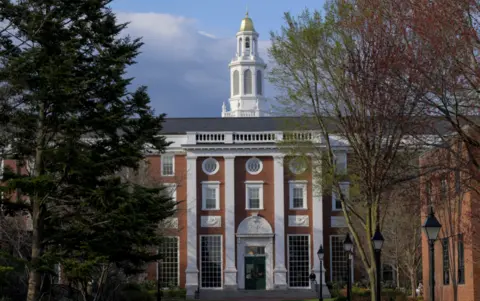Harvard University has filed a lawsuit against the Trump administration claiming that its freezing of federal grants worth billions of dollars is unlawful.
Its president, Alan M Garber, announced the action on Monday in a letter to the university community which said the $2bn funding freeze would hamper critical disease research.
Harvard, the world’s richest university, last week rejected a list of demands that the Trump administration said was designed to curb diversity initiatives and fight anti-semitism at the school.
In response to the lawsuit, the White House said the “gravy train of federal assistance” was coming to an end.
Funding cuts have also been implemented at other elite universities, and a new government anti-semitism task force has identified at least 60 universities for review.
President Donald Trump has accused universities of failing to protect Jewish students during last year’s campus protests against the war in Gaza and US support for Israel.
Also See: Trump Administration Says Harvard May Lose Ability To Enroll Foreign Students
In Monday’s letter, Mr Garber said: “The consequences of the government’s overreach will be severe and long-lasting.”
Studies on pediatric cancer, Alzheimer’s disease and Parkinson’s disease would be affected, he wrote.
“In recent weeks, the federal government has launched a broad attack on the critical funding partnerships that make this invaluable research possible,” the school’s lawsuit said.
It said the withholding of federal funding violated Harvard’s constitutional rights and was being used as “leverage to gain control of academic decisionmaking at Harvard”.
The Trump administration has signalled that another $1bn of federal funding could be suspended. Harvard receives about $9bn in total annually, which is mostly spent on research.
Harvard’s tax exemption status and its ability to enroll international students could also be under threat.

Mr Garber, who is Jewish, acknowledged Harvard’s campus, located in Massachusetts, has had issues with anti-semitism but said he had established task forces aimed at the problem.
He said the university would release the report of two task forces that looked into anti-semitism and anti-Muslim bias.
Separately, the Trump administration has targeted other private Ivy League institutions including suspending $1bn at Cornell University and $510 million at Brown University. Federal dollars also play an outsized role there in funding new scientific breakthroughs.
Others such as Columbia University, the epicentre of pro-Palestinian campus protests last year, have agreed to some demands after $400 million of federal funds was threatened.
The demands to Harvard included agreeing to government-approved external audits of the university’s curriculum as well as hiring and admission data.
In response, Harvard released a blistering letter rejecting what it described as a “takeover” by the federal government.
Former US President Barack Obama, a Harvard alum, has said he supported the university, calling the cash freeze unlawful.
The White House responded Monday night in a statement.
“The gravy train of federal assistance to institutions like Harvard, which enrich their grossly overpaid bureaucrats with tax dollars from struggling American families is coming to an end.
“Taxpayer funds are a privilege, and Harvard fails to meet the basic conditions required to access that privilege.”
Polling by Gallup last summer suggested that confidence in higher education had been falling over time among Americans of all political backgrounds.
That was partly driven, the survey said, by a growing belief that universities push a political agenda. The decline was particularly steep among Republicans.
This news is sourced from BBC and is intended for informational purposes only.

![Harvard files lawsuit against Trump administration over $2bn funding freeze, citing threats to research and academic freedom. [Image via Al Jazeera]](https://southasiatimes.org/wp-content/uploads/2025/04/2025-04-21T213643Z_951402598_RC2KWDAV5IZF_RTRMADP_3_USA-TRUMP-HARVARD-1745274453.webp)

![Afghan men search for victims after a Pakistani air strike hit a residential area in the Girdi Kas village, Nangarhar province on February 22, 2026. [Aimal Zahir/AFP/Getty Images]](https://southasiatimes.org/wp-content/uploads/2026/02/gettyimages-2262391441.webp)


